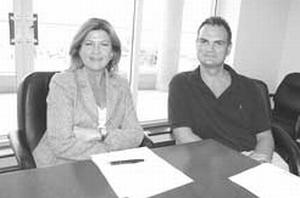
Health cover headache
Wednesday, April 26, 2006
Sharon Roulstone, Chairman of the Board of Directors of CINICO and Gordon Rowell, CEO of CINICO
In its second year of operation, the biggest challenge for the Cayman Islands National Insurance Company (CINICO) is controlling health care costs, which are rising every year.
The CEO of CINICO, Gordon Rowell explained that health care is something that many countries have to grapple with. For instance in the US, there is high accessibility to health care, but it is very expensive and large segments of the population are uninsured. In the UK, Canada and similar countries with national health care, it is affordable to everyone, but there is limited access.
“The public has grown to expect health insurance to pay for everything,” said Mr Rowell. “The challenge will always be balancing accessibility to health care and the costs. The public wants maximum benefits at minimum costs. But you can’t trim costs without taking something away and people don’t want that.”
Mr Rowell noted that one of the primary reasons for setting up CINICO was to provide access to health insurance to people who would otherwise be denied or have difficulty getting cover.
This includes people over 60 years old, in a low-income bracket, seafarers, indigents and people with health impairments. It also provides insurance to civil servants.
The coverage varies depending on which group that an individual falls into. But civil servants have virtually unlimited benefits including dental and vision while the low income and health impaired have a more basic medical coverage plan.
Since CINICO is a non-profit entity it designed its operations to break-even including paying claims and administration. CINICO premiums are primarily paid by Government with some premiums paid by individuals.
According to Mr Rowell 65 percent of health care costs are due to outpatient care, which in CINICO’s terms, is anything that is non-surgical. This would include doctor visits, pharmacy, x-rays, physiotherapy and dialysis.
However, these costs are escalating, because there are many people who overuse the health care services, as there is little to no direct cost to them at the time of use, as individual patients.
In fact, Caribbean Home Insurance Company became insolvent because of the overwhelming number of claims and got to the point where the Government was forced to self-insure. And since there were no controls or discounts in place, Government paid significantly more in health care costs.
Mr Rowell said the remaining 35 percent of the costs are for overseas medical care, which has traditionally been a big portion of the costs. But these are starting to come under control because it has implemented access to health care networks, which allows people insured with CINICO to get discounts for overseas services.
Mr Rowell estimated that CINICO has saved $3.92 million since July 2005 from overseas discounts.
Mr Rowell said one of the impediments to controlling costs has been the lack of data from its main provider, Health Services Authority (HSA).
This information is critical as CINICO needs to identify huge holes in the health care network where money is being unnecessarily wasted or defrauded. However, Mr Rowell said there has been significant progress as representatives of CINICO and HSA have met several times in recent months to work on the billing issues.
Another initiative CINICO is working on is to get a higher level of reinsurance. Reinsurance allows Government to put a cap on the amount of losses of providing health care such as catastrophic disease afflicting a large number of the population. This would limit the costs the Government would have to bear to a certain level.
Although concrete figures were not available by press time it is estimated there are 11,000 people insured with CINICO, which includes civil servants, their dependents and retired civil servants.
The remaining number is spread out among the various groups.
The population of people over 65 is expected to more than triple to 11,300 by 2025. And it is expected the need for CINICO will increase as private insurers start to decline coverage for people as they reach 60 years-old.
Copyright © 2003 - 2006 Cayman Net Ltd All Rights Reserved










Great words you have published in your blog. I like it and I ill share it.
Las Vegas Dentist
Posted by Unknown |
2:09 AM
Unknown |
2:09 AM